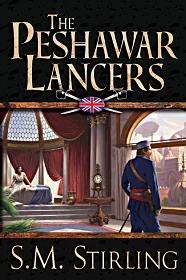What if Lee had won at Gettysburg? What if the Allied Landings at D-Day had been repulsed? Anyone with more than a passing interest in history has likely asked such questions. The reason why such questions would be asked is readily apparent to both the imaginative and contemplative. We live in a world that is the product of countless events, battles, births, deaths, failures and triumphs having turned out one way and not the other. If things had gone just a little differently, how different might the world of today be? Or what if things had gone dramatically differently? Would the world be even recognizable?
For anyone interested in such counter factual speculations, there just so happens to be a small but intriguing genre of speculative fiction intended to sate (and develop ever further) such curiosities and questions. It is called the Alternate History genre.
 Titles such as The Peshawar Lancers by SM Stirling and Guns of the South by Harry Turtledove are good introductions to the genre for anyone intrigued. The former being an exploration of a very different 19th century world and the latter asking what if the Confederacy had acquired AK-47s through future time travelers.
Titles such as The Peshawar Lancers by SM Stirling and Guns of the South by Harry Turtledove are good introductions to the genre for anyone intrigued. The former being an exploration of a very different 19th century world and the latter asking what if the Confederacy had acquired AK-47s through future time travelers.
One important note, that might have gained your attention. The latter involves a more sci fi or fantastical element in time travelers. One major subdivision, perhaps the main subdivision in the genre, is between “hard” alternate history that involves a plausible divergence of events requiring no supernatural or alien intervention, and “soft” alternate history which often does.
A major motif in the latter being the concept of an ISOT. An acronym derived from another series by SM Stirling, the titular Island in the Sea of Time. In that series of three novels, the island of Nantucket is transported into the Bronze Age, so it’s technically a time travel story. A whole geographic location, its infrastructure and people interact with the less advanced locals.
These sorts of events in soft science fiction are facilitated by another motif of the genre, the “alien space bat,” known by its fans as ASB. In that genre, a very powerful alien or godlike being causes people, countries or other entities to travel through time, or otherwise manipulates them or their world in some way. The “ASBs” aren’t characters or influential to the plot, but serve as a writing device to allow something that could not happen under natural circumstances to occur. This allows the author to explore the results in a more characteristic fashion of the genre; for example, an ASB giving the Romans gunpowder and a printing press.
For those not interested in such variants of the genre, more grounded examples exist. Such as Turtledove’s Southern Victory series, where a lucky change of fortune allows the Confederacy to prevail at Antietam, changing the outcome of the Civil War and the history of the 20th century. This change of events is referred to by fans of the genre as a “point of divergence,” that being a point where the history as it really was changes, thus altering the world going forward.
The genre is technically a lot older, dating back to the romantic epoch Tirant lo Blanch written in 1490. In this book, a forerunner to the novel, a Christian knight saves Constantinople in 1453 (an event that would have been within living memory for some at that time, or at least only a generation removed).[1]
Indeed, a great impetus for the genre is wish fulfillment and the desire that “things had gone another way”, a legitimate reason as any to enjoy it, despite what some might say. Though a more academic and objective speculation can also be intriguing and productive.

In conclusion, the genre is both growing and storied though somewhat niche with regards to mainstream exposure, though shows such as Amazon’s Man in the High Castle have done some work to bring it to mainstream audiences. I would encourage anyone who asks “what if” to look into the genre if they have not already, it can be very fun, and indeed can broaden one’s grasp and understanding of historical processes.

Recent Comments